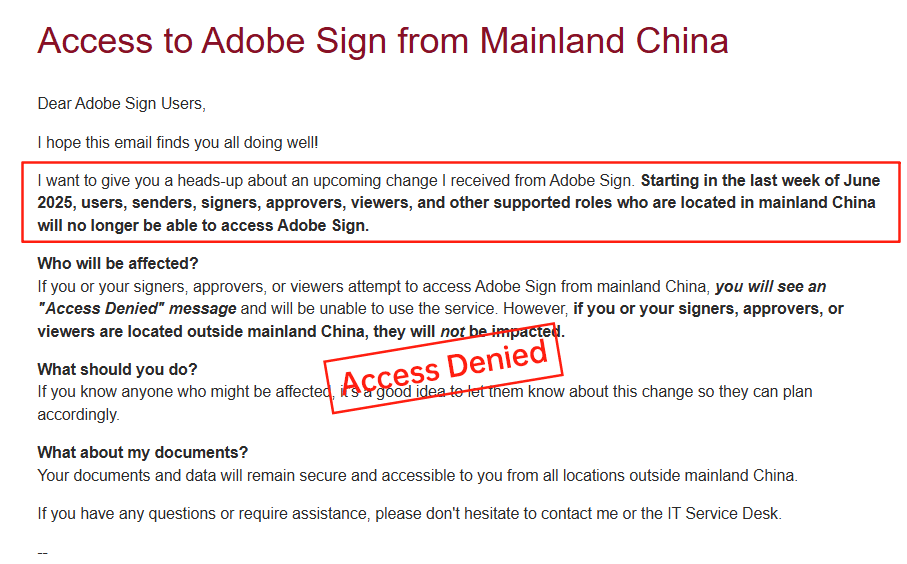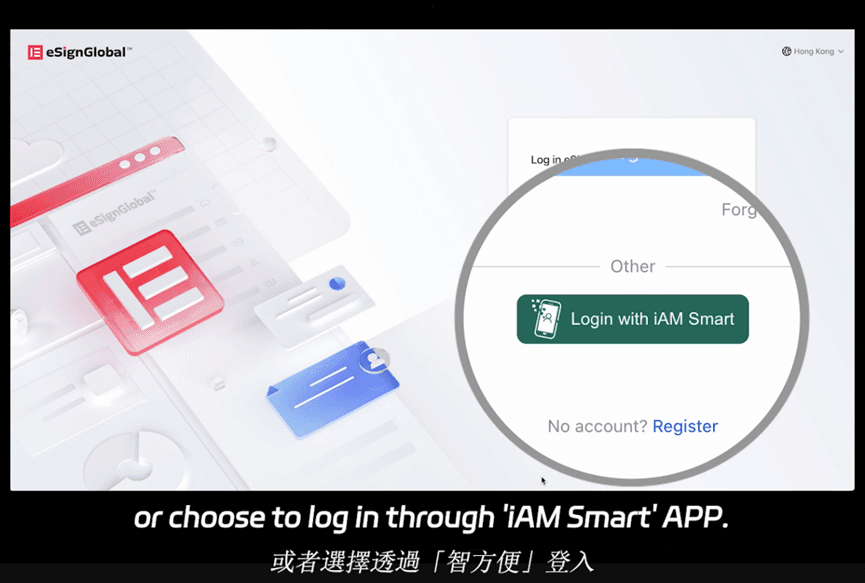Adobe Sign Blocked in China: How Hong Kong Businesses Can Find Alternative Providers





Understanding Hong Kong’s Legal Framework for Electronic Signatures
In Hong Kong, the legal recognition of electronic and digital signatures is governed by the Electronic Transactions Ordinance (Cap. 553). This piece of legislation provides the foundation for the validity, admissibility, and enforceability of electronic records and signatures in both public and private sectors.
The Ordinance distinguishes between two key concepts: “electronic signature” and “digital signature.” A digital signature refers to a form of electronic signature using specific cryptographic techniques and is generated by a private key that is uniquely associated with the signer. It enables verification not only of the signer’s identity but also whether the signed document has been altered post-signature. Electronic signatures, meanwhile, are broader in definition. They can include typed names, scanned images of handwritten signatures, or symbols attached to an electronic record for the purpose of signifying agreement or approval.

Regulatory Role of Recognized Certification Authorities
Hong Kong’s framework for trusted digital signing hinges on the role of recognized certification authorities (CAs). These entities issue digital certificates supporting the user’s identity. The Hongkong Post’s e-Cert, for example, has long been established as a reliable and legally recognized CA. Certificates issued by such providers are used to generate digital signatures, which under Cap. 553 hold the highest level of legal admissibility—comparable to handwritten signatures.
CAs have an essential role in enabling secure, authenticated, and tamper-evident communications. By vetting individuals or organizations and linking their identities cryptographically with their public keys, they underpin Hong Kong’s trusted e-signature ecosystem.
Legal Status of Digital Signatures and Practical Applications
Digital signatures possess a tier-one legal status in Hong Kong. According to Section 6 of the Electronic Transactions Ordinance, if a digital signature is supported by a recognized certificate and is created within the secure parameters defined by the law, it carries the same legal effect and enforceability as a handwritten signature.
By contrast, electronic signatures that fall outside this scope are not automatically deemed invalid. Their legal credibility depends on contextual evidence, such as audit trails, IP addresses, timestamps, and system logs.

Practical Use in Hong Kong’s Business Environment
The deployment of electronic and digital signatures varies across industries in Hong Kong. Below is a summary of relevant uses and commonly adopted tools:
| Business Scenario | Recommended Signature Type | Legal Effect | Common Platforms |
|---|---|---|---|
| Bank Account Opening | Digital Signature | Highest (same as wet ink) | e-Cert (Hongkong Post) |
| Property Transactions | Digital Signature | Highest | DocuSign, eSignGlobal |
| Commercial Contracts | Electronic Signature | Depends on evidence strength | eSignGlobal |
| Internal Approvals | Electronic Signature | Basic confirmation | Enterprise In-House Tools |
This shows that while digital signatures are essential for high-risk or statutory contracts, many organizations consider electronic signatures sufficient for day-to-day operations.
eSignGlobal as an Alternative to Adobe Sign
With Adobe Sign’s shift in strategy and its phased withdrawal from the Hong Kong and mainland Chinese market, many organizations have started seeking alternatives with a better regional focus. eSignGlobal has emerged as one of the major players filling this gap, catering specifically to Asian legal, linguistic, and integration requirements.

Compared to Adobe Sign, eSignGlobal offers several advantages for enterprises in Asia:
- Localized Services: Faster customer support, Chinese-language dashboards, and integration with local certification authorities like HK Post.
- Regulatory Compliance: Built-in compliance with Hong Kong’s Cap. 553 and Mainland China’s Electronic Signature Law ensures seamless cross-border transactions.
- Cost-Effectiveness: Flexible pricing tailored to SMEs and large enterprises, as opposed to Adobe’s one-size-fits-all licensing model.
- Faster Customization: The ability to deploy industry-specific workflows rapidly, particularly beneficial to banking, insurance, and listed companies.
Government Integration and Public Sector Endorsements
Hong Kong’s “iAM Smart” platform integrates with digital signatures to allow citizens to interact confidently with government services. From tax filings to business registration renewals, digital identities authenticated via the platform enable end-to-end document submissions with legal recognition.
Notably, various departments including the Inland Revenue Department and Companies Registry have embraced qualified e-signatures and digital signing solutions certified by recognized CAs, further legitimating their use in formal exchanges.
Popular Solutions Among SMEs
For small and medium-sized enterprises in Hong Kong, choosing the right signature solution is often a balance between cost, compliance, and efficiency. While large firms may implement high-end integrations, SMEs often turn to platforms like eSignGlobal, Adobe Sign, and HelloSign for different use cases.
Key selection factors include:
- Regulatory compatibility (e.g., supports Cap. 553)
- Usability (e.g., multilingual UI)
- Audit and evidence features
- Vendor support responsiveness
- Integration with ERP, CRM or ECM tools
In this landscape, eSignGlobal stands out for providing reliable digital signatures at a price point and support level more favorable to regional SMEs compared to global but less locally-attuned competitors.
Cross-Border Validity: Hong Kong and Mainland China
It is crucial for businesses conducting operations in both jurisdictions to understand the differences between Hong Kong’s and Mainland China’s signature laws. While Hong Kong emphasizes digital certificates tied to recognized certification authorities for full legal effect, Mainland China’s Electronic Signature Law (中华人民共和国家电子签名法) outlines different classes of electronic signatures with divergent thresholds for use in contracts and administrative processes.
As such, not all signatures valid in Hong Kong are automatically accepted in China. Companies are advised to use platforms compliant with both regimes—some recognized operators dual-certify for both Hong Kong and China or offer integrated signing workflows separately optimized per jurisdiction.

Compliance Strategy and Risk Management
Evaluating the risks associated with electronic documentation is critical. Entities should implement internal policies for:
- Identity verification protocols
- Data retention policies compliant with the Evidence Ordinance
- Regular audits and cryptographic witness logs
- Maintaining linkage between the document, the signer, and the time of execution
Moreover, businesses should establish contingency plans to prevent disputes regarding authenticity, particularly for high-value or long-term contracts.
Selecting a Trusted Signature Provider
When choosing an e-signature vendor within Hong Kong, businesses should focus on the following indicators:
- Certification under Cap.553-recognized CAs
- Data residency within lawful jurisdictions (preferably Hong Kong or countries bound by GDPR)
- Transparent documentation and signing logs
- Proven local coverage and reference clients
- Integration with local identity platforms such as “iAM Smart”
It is not just about the technology but also legal enforceability and regulatory alignment. For companies with ambitions across Asia-Pacific, products like eSignGlobal offer a balance between local compliance and international usability, outperforming foreign-heavy giants like Adobe Sign especially when claim handling or integration urgency is involved.
A strong electronic signature strategy is no longer optional for companies operating in Hong Kong—it’s a legal imperative. With the right tools and knowledge of the legal terrain, businesses can achieve security, compliance, and operational efficiency with confidence.

 Only business email allowed
Only business email allowed


